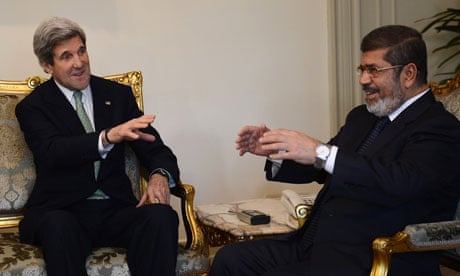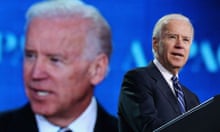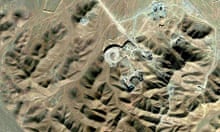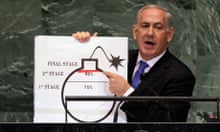US Secretary of State John Kerry on Sunday rewarded Egypt for president Mohammed Morsi's pledges of political and economic reforms by releasing $250m in American aid to support the country's "future as a democracy".
Yet Kerry also served notice that the Obama administration will keep close watch on how Morsi, who came to power in June as Egypt's first freely elected president, honors his commitment and that additional assistance would depend on it.
"The path to that future has clearly been difficult and much work remains," Kerry said in a statement after wrapping up two days of meetings in Egypt, a deeply divided country in the wake of the revolution that ousted longtime president Hosni Mubarak.
Egypt is trying to meet conditions to close on a $4.8bn loan package from the International Monetary Fund. An agreement would unlock more of the $1bn in US assistance promised by President Barack Obama last year and set to begin flowing with Kerry's announcement.
"The United States can and wants to do more," Kerry said. "Reaching an agreement with the IMF will require further effort on the part of the Egyptian government and broad support for reform by all Egyptians. When Egypt takes the difficult steps to strengthen its economy and build political unity and justice, we will work with our Congress at home on additional support."
Kerry cited Egypt's "extreme needs" and Morsi's "assurances that he plans to complete the IMF process" when he told the president that the US would provide $190m of a long-term $450m pledge "in a good-faith effort to spur reform and help the Egyptian people at this difficult time." The release of the rest of the $450m and the other $550m tranche of the $1bn that Obama announced will be tied to successful reforms, officials said.
Separately, the top US diplomat announced $60m for a new fund for "direct support of key engines of democratic change", including Egypt's entrepreneurs and its young people. Kerry held out the prospect of assistance to this fund climbing to $300m over time.
Recapping his meetings with political figures, business leaders and representatives of outside groups, Kerry said he heard of their "deep concern about the political course of their country, the need to strengthen human rights protections, justice and the rule of law, and their fundamental anxiety about the economic future of Egypt".
Those issues came up in "a very candid and constructive manner" during Kerry's talks with Morsi.
"It is clear that more hard work and compromise will be required to restore unity, political stability and economic health to Egypt," Kerry said.
Syria and Iran were topics of discussion, according to officials.
With parliamentary elections in April approaching and liberal and secular opponents of Morsi's Muslim Brotherhood saying they will boycott, Kerry called the vote "a particularly critical step" in Egypt's democratic transition.
Violent clashes between protesters and security forces have created an environment of insecurity, complicating Egyptian efforts to secure vital international aid.
Officials in the Egyptian presidency said Kerry stressed the need for consensus with the opposition in order to restore confidence in Egypt that it can ride out the crisis. Morsi was reported to have expressed the importance of Egypt's relationship with United States, which is based on "mutual respect," and focused on the importance of the democratic process in building a strong and stable nation.
Kerry made clear that in all his meetings, he conveyed the message that Egyptians who rose up and overthrew Mubarak "did not risk their lives to see that opportunity for a brighter future squandered."
On Saturday, he told the country's bickering politicians that they must overcome differences to get Egypt's faltering economy back on track and maintain its leadership role in the volatile Middle East.
The US has expressed concerned that continued instability in Egypt will have broader consequences in a region already rocked by unrest.
The opposition accuses Morsi and the Brotherhood of following in the footsteps of Mubarak, failing to carry out reforms and trying to install a more religiously conservative system.
Morsi's administration and the Brotherhood say their foes, who have trailed significantly behind Islamists in all elections since the uprising against Mubarak, are running away from the challenge of the ballot box and are trying to overturn democratic gains.








Comments (…)
Sign in or create your Guardian account to join the discussion